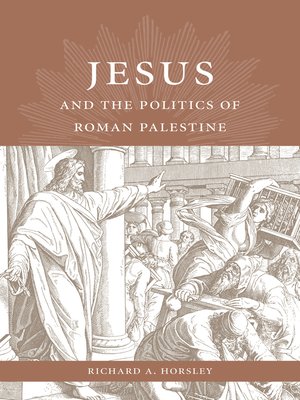
Sign up to save your library
With an OverDrive account, you can save your favorite libraries for at-a-glance information about availability. Find out more about OverDrive accounts.
Find this title in Libby, the library reading app by OverDrive.



Search for a digital library with this title
Title found at these libraries:
| Library Name | Distance |
|---|---|
| Loading... |
This comprehensive critical analysis of the historical Jesus examines his mission and involvement in the conflicted politics of ancient Palestine.
In Jesus and the Politics of Roman Palestine, Richard A. Horsley brings the context and implications of recent historical research to bear on our understanding of Jesus of Nazareth. Based on a critical reconsideration of the Gospels and contemporary sources for Roman imperial rule in Judea and Galilee, Horsley argues that Jesus was deeply concerned with the politics of his day. Drawing on anthropological studies of peasant politics, Horsley discerns how Jesus, as a Moses- and Elijah-like prophet, generated a movement of renewal in Israel that was focused on village communities.
Following the traditional prophetic pattern, Jesus pronounced God's judgment against the rulers in Jerusalem and their Roman patrons. This confrontation with the Jerusalem rulers and his martyrdom at the hands of the Roman governor, however, became the breakthrough that empowered the rapid expansion of his movement in the immediately ensuing decades. In the broader context of this comprehensive historical construction of Jesus's mission, Horsley also presents a fresh new analysis of Jesus's healings and exorcisms and his conflict with the Pharisees, topics that have been generally neglected in the last several decades.
In Jesus and the Politics of Roman Palestine, Richard A. Horsley brings the context and implications of recent historical research to bear on our understanding of Jesus of Nazareth. Based on a critical reconsideration of the Gospels and contemporary sources for Roman imperial rule in Judea and Galilee, Horsley argues that Jesus was deeply concerned with the politics of his day. Drawing on anthropological studies of peasant politics, Horsley discerns how Jesus, as a Moses- and Elijah-like prophet, generated a movement of renewal in Israel that was focused on village communities.
Following the traditional prophetic pattern, Jesus pronounced God's judgment against the rulers in Jerusalem and their Roman patrons. This confrontation with the Jerusalem rulers and his martyrdom at the hands of the Roman governor, however, became the breakthrough that empowered the rapid expansion of his movement in the immediately ensuing decades. In the broader context of this comprehensive historical construction of Jesus's mission, Horsley also presents a fresh new analysis of Jesus's healings and exorcisms and his conflict with the Pharisees, topics that have been generally neglected in the last several decades.







